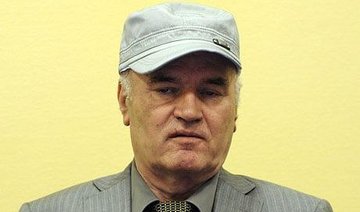THE HAGUE: Dutch prosecutors are investigating how a Bosnian Croat war criminal managed to dramatically take his own life Wednesday, apparently after drinking poison he had smuggled into a UN court, in scenes that were broadcast live.
In shocking footage beamed around the world, Slobodan Praljak drank from a small brown glass bottle and exclaimed he had taken poison moments after UN judges upheld his 20-year jail term for atrocities committed during the 1990s Balkans conflict.
The 72-year-old died in hospital after being rushed from the International Criminal Tribunal for the former Yugoslavia (ICTY), casting a cloud over what should have been a successful end to the court’s tenure.
Prosecutors said their investigation would focus on what killed Praljak and whether he had received any outside help in obtaining the suspected poison.
“For the time being the inquiry will focus on assisted suicide and violation of the Medicines Act,” the Public Prosecution Service said in a statement late Wednesday, adding it would not be commenting further.
The unprecedented drama came as judges handed down their very last verdict at the court in the appeal case of six Bosnian Croat political and military leaders.
Praljak, a former military commander of a breakaway Bosnian Croat statelet, shouted out angrily: “Praljak is not a criminal. I reject your verdict.”
Standing tall, with a shock of white hair and beard, he then raised a small brown bottle to his lips, and tipped it into his mouth. The hearing was quickly suspended as Praljak’s lawyer interjected: “My client says he has taken poison.”
ICTY spokesman Nenad Golcevski told reporters that Praljak “quickly fell ill” and died in hospital. He could not confirm what was in the bottle.
The stunning events caused a shockwave in Croatia and intense embarrassment at a war crimes tribunal that closes next month more than two decades after being set up at the height of the 1992-1995 Bosnian conflict.
Among the questions to be answered will be how he managed to evade tight security to smuggle the bottle into the tribunal.
And if the liquid was indeed poison or noxious, how did he acquire it in the UN detention center in The Hague where he was being held?
Croatia’s Prime Minister Andrej Plenkovic slammed the “injustice” of the UN tribunal and expressed his condolences.
“His act, which we all unfortunately witnessed today, speaks mostly about the deep moral injustice toward six Croats from Bosnia and the Croatian people,” he told reporters.
Praljak’s act demonstrated “what sacrifice he was ready to make” to show he was “not a war criminal,” said Dragan Covic, the Croat member of Bosnia’s tripartite presidency.
“It is a humiliation of this institution which has existed since 1993.”
Late Wednesday candles were lit in the former breakaway statelet’s capital Mostar by Bosnian Croats and other residents in tribute to the late general.
It is not the first time that defendants have taken their own lives at the ICTY.
Former Croatian Serb leader Milan Babic killed himself in his cell at the UN detention center in 2006, after another Croatian Serb, Slavko Dokmanovic, in 1998.
And former Serbian president Slobodan Milosevic was found dead in his cell in 2006 from natural causes before his trial could be completed.
In the complex ruling, the judges upheld the jail terms against all six defendants, including a 25-year sentence imposed on Jadranko Prlic, the former prime minister of the breakaway Bosnian Croat statelet, known as Herzog-Bosna.
Praljak had been specifically charged with ordering the destruction of Mostar’s 16th-century bridge in November 1993.
In their ruling, the judges allowed part of Praljak’s appeal, saying the bridge had been “a military target at the time of the attack.” But they refused to reduce his overall sentence.
The bloody 1992-1995 war in Bosnia, in which 100,000 people died and 2.2 million were displaced, mainly pitted Bosnian Muslims against Bosnian Serbs, but also saw some brutal fighting between Bosnian Muslims and Bosnian Croats after an initial alliance fell apart.
The appeal judges said all six men, who had been found guilty of seeking to remove Bosnian Muslims from the territory, “remained convicted of numerous and very serious crimes.”
In statements sure to anger Zagreb, the judges upheld the original trial finding that the men had been part of a joint criminal enterprise whose “ultimate purpose was shared” by late Croatian president Franjo Tudjman, and other leaders.
The aim of the scheme was to set up “a Croatian entity that ... facilitated the reunification of the Croatian people.”
Terms ranging from 10 to 20 years were also upheld against the four other defendants.
Wednesday’s verdict comes a week after the judges imposed a life sentence on former Bosnian Serb military commander Ratko Mladic.
His judgment had also descended into confusion when he accused the judges of lying and had to be dragged away into a nearby room.
The ICTY closes its doors on December 31, having indicted and dealt with 161 people.
Now see the moment Slobodan Praljak drank the poison
















